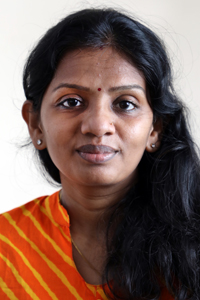The lawyer from Mannar who won’t give up the fight

Ranitha Gnanarajah
She has been in the headlines this week and now has her own Wikipedia page, but 41-year-old Ranitha Gnanarajah, just three days after receiving an International Women of Courage award, is busy at her simple Bambalapitiya office- buried in files even though it’s Mahasivaratri – when it’s time for family kovil vigils, marigold garlands and shimmering sarees.
On March 8, in a virtual ceremony, the human rights activist and lawyer was given the award instituted by then US Secretary of State Condoleezza Rice in 2007 to mark International Women’s Day, probably America’s answer to a gloves-off damehood, one where the criteria is “leadership, courage, resourcefulness, and willingness to sacrifice for others- especially in promoting women’s rights”.
Born and brought up in Mannar, Ranitha went to St. Xavier’s Girls’ National College and left the tiny island only when she got the opportunity to study law at the Colombo University.
A grandfather who was president of the citizens’ committee of the island inspired Ranitha to be a human rights activist and lawyer. “He helped a lot of families affected by the violation of human rights- arrest, detention, disappearance, torture.”
Ranitha’s work for the marginalized has been twofold. Firstly, providing free legal aid to prisoners detained without charge under the Prevention of Terrorism Act, and to families seeking to learn the fate of relatives believed to have been victims of forced disappearances. Alien to the confused melee of Colombo, their tragedies often lost in translation, families of the disappeared feel overwhelmed. Those detained too tend to suffer due to long delays in court cases.
The second area she is active in is against sexual and gender-based violence, and ‘for’ women’s equal rights to land and property. ‘Visiting the field’ she sits down with rural women’s groups, and builds up awareness of legal practices, procedures, and the supportive mechanisms available to them at community level.
She takes up serious cases of sexual violence – rape, abuse, harassment, appearing voluntarily in court on behalf of the aggrieved party. “To say the whole story from the victim’s side is important.”
In cases of domestic and gender-based violence, Ranitha works with police stations, supporting the victims to make the complaint and file domestic violence actions through police or other agencies like legal aid commissions.
Another segment of her work that was recognized was leading “awareness campaigns that have increased access to women’s shelters, counselling services, and medical care for survivors of domestic violence”. But land issues have been, by far, the most bedeviling.
In the aftermath of the war, with many women struggling to claim ownership of lands registered in the names of husbands and male relatives, Ranitha and her colleagues spend a lot of time negotiating with the land officers on their behalf.
When news rippled of Ranitha’s achievement, many she helped rang her, their voices jubilant, to tell her they are celebrating. It was not her win alone.
Nonetheless, being a woman activist braving the post-war quagmire is no cakewalk. Looks of askance at an ‘NGO worker’ have to be taken in her stride, and being a woman itself is a disadvantage. “They will flirt or comment or criticize- and try to bring your energy down and not allow you to do the work properly.”
“But when I feel I am getting down with energy, on the other hand, I get the support of my male colleagues,” she says gratefully.
Ranitha has this to say to her sisters: “Don’t give up the fight. We will be in a better world in the future. For that, we have to work towards goals and face challenges. And then make those challenges steps- to move on with our work.”
Her appeal to the world at large would be to “help women working in their professional fields. Don’t criticize or underestimate their courage or energy- walk along with them and support them; it will create an opportunity for women to work on an equal platform.”



